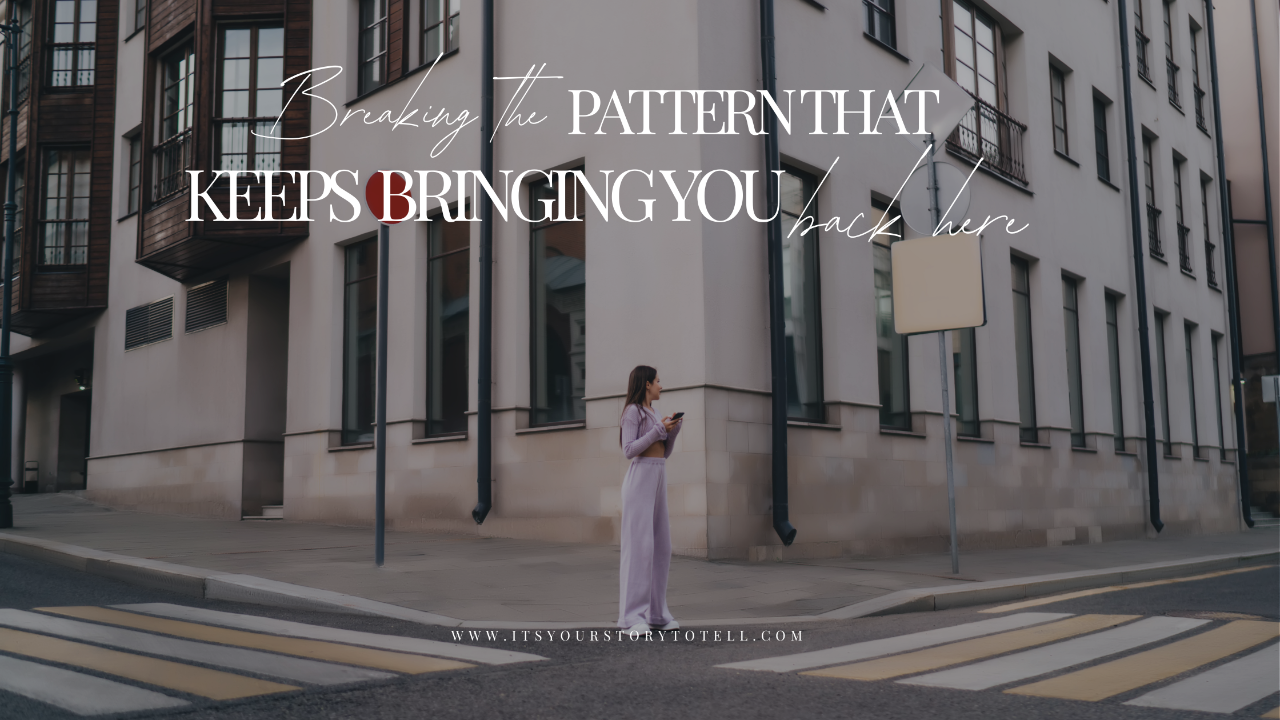Rewrite Your Story: Overcome Limiting Beliefs for a Life of Your Dreams
Sep 11, 2023
It was 2:37am, I had awoken from a fitful sleep with an overwhelming sense of dread and my mind racing.
“I never should have moved my kids halfway across the country, how could I do this to them?”
“You left your career, your friends, your community and support system and now what’s going to happen…what were you thinking?”
“Your kids will never forgive you for uprooting them... You are a bad mom”
Panic clutched at my throat. It felt like a giant fist was squeezing my throat while simultaneously feeling like there was a lump so large, I could barely swallow and it felt difficult to catch a breath. I could feel my heart pounding and I felt like I was going to explode.
Tears pricked at the back of my eyes, but I refused to let them fall, knowing that crying would make me congested, and my panic worsen as it would be even harder to breathe.
The silence of the house felt deafening, and the darkness was oppressive. I looked across my king size bed at the emptiness of the opposite side.
“…why did you leave me here alone”, I cried out inwardly “…It’s not fair! I never wanted this life… being a single mom with everything on my shoulders, I shouldn’t have to do this on my own”.
Suddenly, unable to keep still, I tossed the blanket back and jumped up, pacing back-and-forth on the soft carpet of my bedroom, running my hand through my hair agitatedly as I tried, unsuccessfully, to calm myself down.

“What was wrong? Why was I feeling this way?” I had no real reason to be panicking in the middle of the night. My five kids were sleeping soundly in their rooms just down the hallway. The house was quiet and warm. I tried to tick off the reasons that I was safe and to be grateful, but my mind was racing too quickly for me to make sense of the thoughts.
“I can’t be sick, I don’t have anyone to take care of me and then who would take care of everything else that needs to be done?”, I knew logically that there was nothing physically wrong with me. But my subconscious was running away with another belief and my body was responding, making my heart pound in my ears, my fingers tingle and my vision spark at the edges.
Huh, I am hyperventilating, and I just might pass out…” I pressed my trembling fingers to my lips as I paced back and forth. “God please help me. I don’t know what’s wrong. I don’t know why I feel this way and I know that these thoughts and feelings are not true or what I want to believe. I know that I am not alone because You are with me. You promised you would never leave me and even though I feel terrible and alone right now, I am asking that You would give me peace”.
This was not the first panic attack that I had endured, it had begun recently and were becoming a more frequent experience of my nightly routine.
Four years after losing my husband, I moved my children and I halfway across the country. I had thought it was the right thing, I had talked with trusted friends and spent a LOT of time praying about it. I felt at peace and even excited about the move. I felt like this was a chance for my kids and I to start anew, for them to not be “the-kids-whose-dad-died” and for me to not be “the-poor-widow”.

But uprooting our lives from the only community that my kids had ever known and the adult community that my husband and I had built before he died was a lot more challenging that I had appreciated. Originally excited, my kids were devastated by the move in ways that I had not anticipated or expected.
Major financial setbacks had almost decimated my monthly budget and savings. I was having difficulty getting my license transferred to our state, and therefore couldn’t get a job to bring in the necessary income to pay our monthly bills. I was feeling pulled in a million directions and stretched to the limit, overwhelmed with guilt and fears that I had ruined our family.
My story is perhaps an extreme example of limiting beliefs and the detrimental effects they can have upon us. But I think it’s one that many of us can understand and perhaps identify with. I realized I needed help and ended up finding a coach who worked with me and gave me simple and effective ways to manage and transform those negative beliefs and allow me to begin to build positivity back into my life again.
Through prayer, God gave me a simple, yet powerful mantra that I repeated, without having to think about it, whenever I began to feel those niggles of worry and panic. I was able to speak truth to my wounded heart and this allowed me the space to believe it and to turn off that “flight-or-fight” response. Using simple phrases may sound silly, but it was the key for me and that along with my coaching work and implementing other healthy lifestyle choices, I was able to manage those midnight attacks and eventually stop them all together.
So, what are limiting beliefs and what are the steps needed to go about transforming them to have a positive impact on our life and not a negative one?
Our beliefs are the lens through which we perceive the world. They influence our thoughts, feelings, actions, and ultimately, our reality. It's often said that what we believe becomes our truth. In Proverbs we are strongly encouraged/warned to “guard our heart [or thoughts] above all else, for it determines the course of your life” (Prov 4:23 NLT and CEV). Understanding and harnessing the power of beliefs is crucial for personal growth and fulfillment.
Our beliefs can have a positive impact, or as with my experience above, a negative one. Self-limiting beliefs are the thoughts that shackle us, sow seeds of doubt, and hold us back from reaching our full potential. One of the first steps in reshaping our reality is to recognize and challenge self-limiting beliefs. According to modern psychology, self-limiting beliefs often stem from childhood experiences, societal conditioning, or negative past events.

Beliefs are not just passive thoughts; they actively shape our reality in various ways. Let's explore three ways in which our beliefs exert their influence.
Self-Fulfilling Prophecies: When we believe something strongly, we often subconsciously act in ways that align with that belief. For instance, if you believe you will fail at a task, you may not put in your best effort, increasing the likelihood of failure.
Perception Filters: Beliefs act as filters through which we perceive the world. If you believe people are generally kind and trustworthy, you'll notice and attract more positive interactions. Conversely, if you believe people are untrustworthy, you might notice more negative behaviors.
Emotional Impact: Our beliefs have a direct impact on our emotions. Believing in your abilities and self-worth can boost self-confidence and reduce anxiety. Conversely, self-limiting beliefs often lead to stress, self-doubt, and depression – or even late-night panic attacks.
However, beliefs are not static; they are malleable. Cultivating a growth mindset can help us embrace challenges and see failures as opportunities for growth. A growth mindset is the belief that abilities and intelligence can be developed through dedication and hard work.
Now that we understand the power of beliefs let's explore a practical approach to eliminating, or transforming, self-limiting beliefs.
Step 1: Self-Awareness - The first step is recognizing the belief and its impact on your life. Be honest with yourself about the thoughts that are holding you back.
Step 2: Identify the Source - Try to pinpoint where these beliefs originated. Were they formed in childhood, as a result of past failures, a traumatic experience, or due to external influences?
Step 3: Challenge the Belief - Actively question the validity of your belief. Is there concrete evidence supporting it, or is it a mere assumption?
Step 4: Replace with Empowering Beliefs - Develop positive affirmations and beliefs that counteract the self-limiting ones. In my example with panic attacks, I replaced "I can’t breathe, something is wrong, I’m going to die" with "I am healthy. I am whole. I have vibrant wellness."
Step 5: Take Action - The act of challenging our beliefs with concrete evidence can be transformative. It shifts the balance of power from our self-limiting beliefs to empowering truths. Your beliefs will only change if you take action. Push yourself to step out of your comfort zone and prove to yourself that your new beliefs are valid. Type out your positive affirmations and post them where you can read them daily. Read them aloud while you’re doing your makeup or hair in the mornings! It’s important and as noted in studies, can have a profound impact on the subconscious which in turn can have a positive and lasting impact on your health, your response to stress, etc.
Step 6: Seek Support - Sometimes, it's helpful to seek guidance from a therapist, coach, mentor, or support group to assist in breaking free from deeply ingrained self-limiting beliefs. Understanding that these beliefs often have deep roots in our past can be a powerful catalyst for change. It empowers us to recognize that we are not defined by our history, and we can reframe our beliefs by challenging and rewriting the narrative we inherited. But it can be difficult, and it is important to seek support and help as needed.

Your life is a story, and your beliefs are like contributing authors of that story. With the wisdom gained from understanding self-limiting beliefs, recognizing their impact on our reality, and implementing practical steps to change them, you have the power to craft a narrative that aligns with your deepest aspirations. As you turn the page to the next chapter of your life, may you find the courage to rewrite your story with conviction, resilience, and boundless belief in your God given potential.
Get to Know Me!

Coach - Hannah Chijioke-Davis (itsyourstorytotell.com)
Hannah is a compassionate transformational coach specializing in helping women navigate health concerns, life's disappointments, unfulfillment, and grief. She is dedicated to empowering her clients to rediscover their inner strength, restore vibrant wellness, and find purpose in their journey. Hannah's empathetic and non-judgmental approach creates a safe space for clients to express their emotions, fears, and aspirations. Drawing from her personal experiences with trauma, grief, and creating a new normal, she guides clients through healing and renewed perspectives. With a holistic approach, she tailors each session, co-creating personalized action plans to achieve tangible progress. Hannah fosters a sense of community through group workshops, nurturing connections among her clients. Her unwavering commitment and passion make her a trusted mentor and motivator, helping clients embrace life's challenges with resilience and grace.

Life's emotional landscape can be challenging, but it's also an incredible journey of growth. In this 7-day exploration, we delve into the depths of grief and disappointment, uncovering valuable lessons and inner strength. Through practical steps, including journaling, mindfulness, self-care practices like hydration and nourishment, you'll discover your resilience and capacity for empowerment. This journey isn't just about healing; it's about transformation. With each day, you'll nurture self-discovery and embrace the potential for emergence. As you progress, know that we're here to support you on your path towards a life filled with purpose, joy, and vitality. Start your transformative journey today!
Get my free Navigating Grief & Disappointment eBook and audio.
Our goal is to equip you with tools to empower your healing journey and another one of those tools to support you in navigating grief is mindful meditation.
Mindful meditation offers a profound and nurturing path for navigating the often-turbulent journey of grief. In the midst of loss and sorrow, it provides a sanctuary where we can gently observe and accept our emotions without judgment. By grounding ourselves in the present moment through mindfulness, we create a refuge from the past regrets and future anxieties that often accompany grief. This practice teaches us to acknowledge our feelings, no matter how overwhelming, and allows us to sit with them in a compassionate and non-reactive way. Through mindful meditation, we gradually learn to release the grip of grief's intense emotions, finding moments of peace and clarity amidst the storm. It becomes a tool for self-compassion and healing, helping us rediscover our inner strength and resilience as we move forward on our healing journey.
🎧 Listen Now: Navigating Grief with Mindful Meditation

Let us encourage you to embrace your potential! Remember, we're here to support you every step of the way.
Book a Free Discovery Call to get the one-on-one support you need! We will meet you where you are and find ways to come alongside you no matter where you are in your journey. We will hear your story and work with you and your budget to develop a plan forward!
View The Entire Collection
See all our blog posts to discover valuable insights and tools for navigating trauma and healing with guidance and support.












